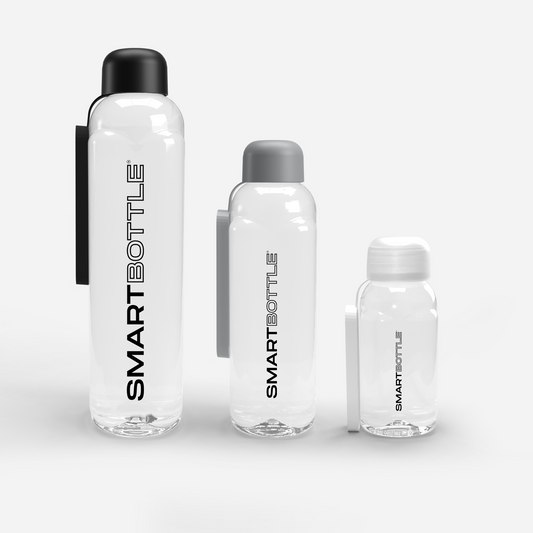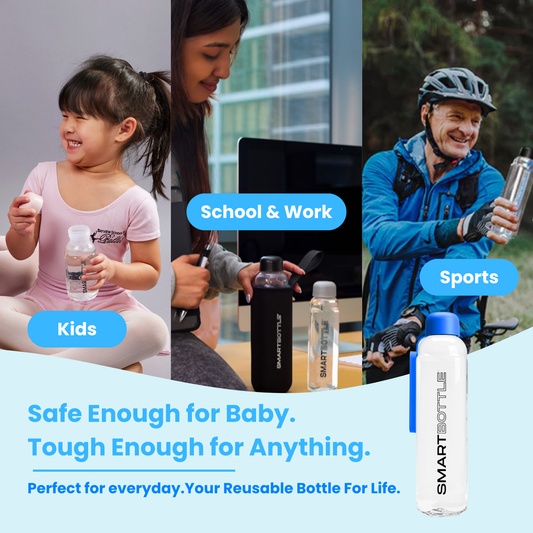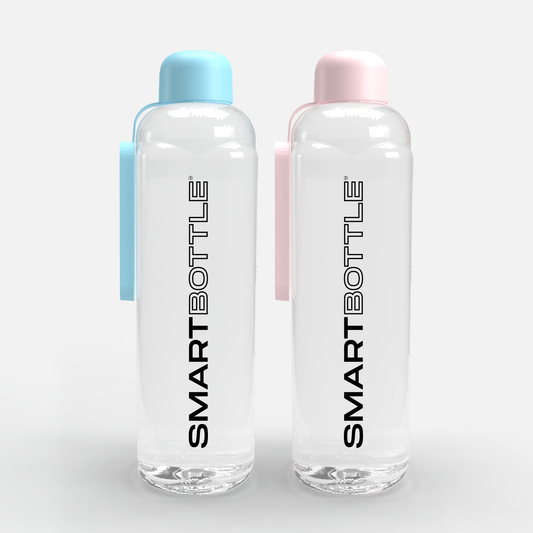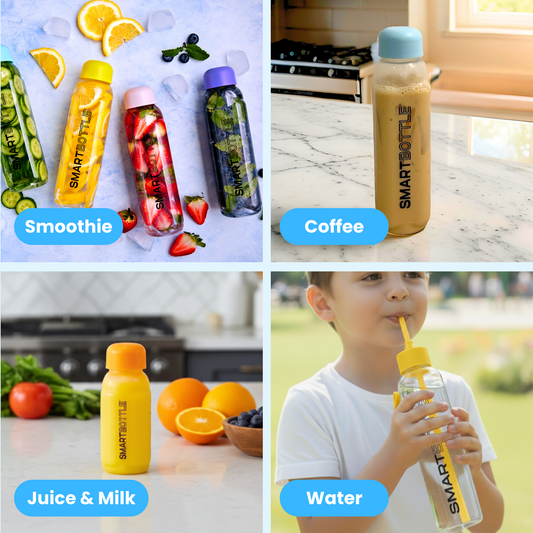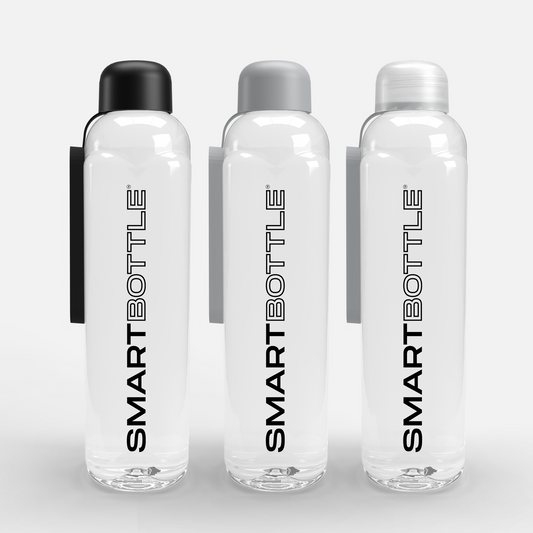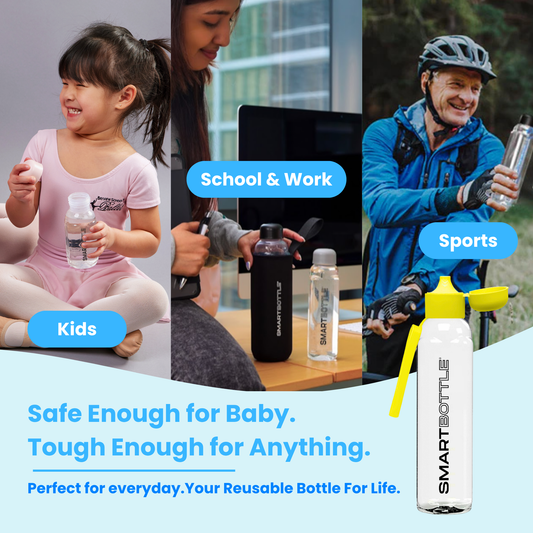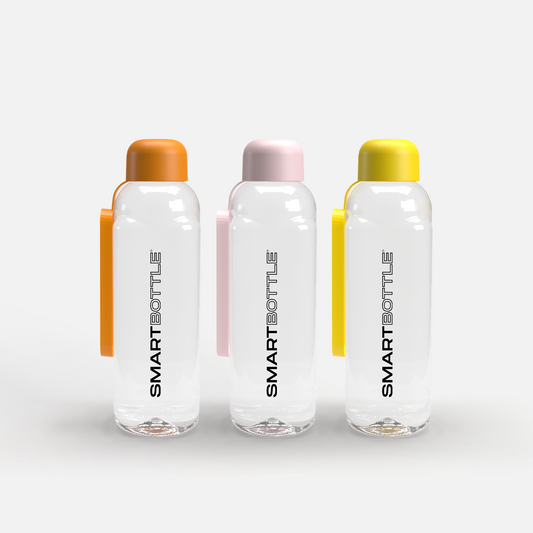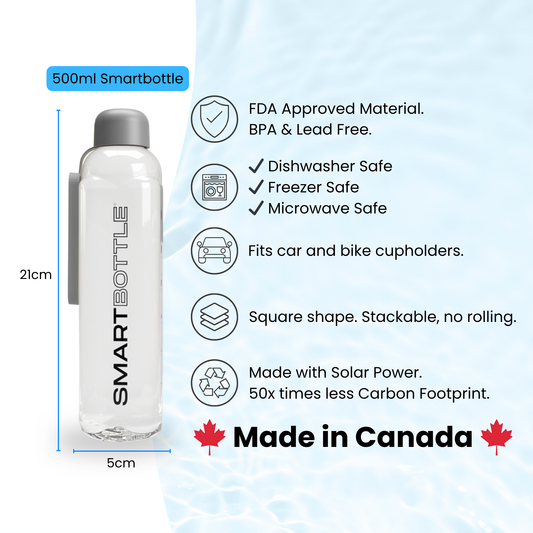
Which Type of Plastic Water Bottle is the Best? The Complete Guide to Making the Safest Choice
Share
Not all plastic water bottles are created equal. In fact, the type of plastic your bottle is made from can significantly impact your health, the environment, and how long your bottle will last.
How to Check Your Current Water Bottle

Not sure what your current bottle is made from? Here's how to check:
1.Flip your bottle upside down and look for the recycling triangle
2.Check the number inside the triangle (1-7)
3.Look for material codes like "PET," "PP," or "HDPE"
4.If there's no marking, it's time for a replacement
If your bottle is #1, #3, #6, or an unmarked #7, consider upgrading to a safer option. Let's break down what each number means. Understanding the type of plastic can help you make a more informed decision about safety, durability, and environmental impact.
Types of Plastic
#1 - PET (Polyethylene Terephthalate)
Where You'll Find It: Single-use water bottles, soda bottles, juice containers
Pros:
- Lightweight and convenient for single use
- Widely recyclable in most municipalities
Cons:
- Not designed for long-term or repeated use
- Can degrade and release chemicals when exposed to heat or sunlight
- May harbor bacteria in scratches after repeated washing
- Breaks down over time with multiple uses
- Not suitable for hot beverages
Best For: Single-use situations only
#2 - HDPE (High-Density Polyethylene)
Where You'll Find It: Milk jugs, detergent bottles, some reusable water bottles
Pros:
- Highly durable and impact-resistant
- Does not leach harmful chemicals
- Suitable for both hot and cold beverages
- Good resistance to acids and bases
- Widely recyclable
Cons:
- Heavier and less flexible than PET bottles
Best For: Budget-conscious consumers wanting a reusable option
#3 - PVC (Polyvinyl Chloride)
Where You'll Find It: Rarely used for water bottles (more common in pipes and packaging)
Pros:
- Strong and weather-resistant
- Inexpensive to produce
Cons:
- Can leach harmful chemicals including phthalates and dioxins
- Contains chlorine-based compounds
- Difficult to recycle
- NOT RECOMMENDED for food or beverage storage
Best For: Avoid for drinking water entirely
#4 - LDPE (Low-Density Polyethylene)
Where You'll Find It: Squeezable bottles, some flexible water bottles
Pros:
- Flexible and easy to squeeze
- Impact-resistant
- Generally considered safe with low leaching potential
- Resistant to acids and bases
Cons:
- Not heat-resistant (unsuitable for hot beverages)
- Can be difficult to clean thoroughly
- Not as durable as other options
Best For: Collapsible travel bottles or sports squeeze bottles
#5 - PP (Polypropylene) ⭐ THE GOLD STANDARD
Where You'll Find It: Premium reusable water bottles, baby bottles, food storage containers, medical equipment
Pros:
- Highest heat resistance among food-grade plastics
- Extremely low chemical leaching potential
- Dishwasher, microwave, and freezer safe
- Used in medical implants and surgical equipment
- Durable and long-lasting
- Resistant to fatigue from repeated use
- Can be sterilized without degradation
- FDA-approved for baby bottles
Cons:
- Slightly heavier than PET
- Can be more expensive than lower-grade plastics
Best For: Daily use, families with children, health-conscious consumers, anyone wanting the safest plastic option
#6 - PS (Polystyrene)
Where You'll Find It: Disposable cups, takeout containers (rarely used for water bottles)
Pros:
- Lightweight and inexpensive
- Good insulation properties
Cons:
- Can leach styrene, a possible carcinogen
- Breaks and cracks easily
- Not heat-resistant
- Difficult to recycle - Environmental concerns
Best For: Avoid for regular water bottle use
#7 - Other (Including Polycarbonate/PC)
Where You'll Find It: Some reusable bottles, large water cooler bottles
Pros:
- Durable and shatter-resistant
Cons:
- May contain BPA (Bisphenol A), linked to hormone disruption
- Scratches can harbor bacteria
Best For: Only if explicitly labeled "BPA-free" but better alternatives exist
Why #5 Polypropylene (PP) Wins: The Science Behind the Choice
Polypropylene isn't just another plastic - it's the material trusted by medical professionals and chosen for baby bottles worldwide. Here's why:
Medical-Grade Safety: The same material used in joint replacement surgery and surgical sutures is protecting your drinking water. That's the level of biocompatibility you're getting with PP #5.
Heat Stability: With a melting point of 320°F (160°C), polypropylene maintains its integrity even in extreme conditions. Leave it in a hot car? Still safe. Put it in the dishwasher? No problem.
Chemical Resistance: Polypropylene's molecular structure makes it highly resistant to leaching, even when exposed to acidic beverages, heat, or repeated cleaning.
Longevity: Unlike single-use plastics that degrade quickly, polypropylene maintains its properties through years of daily use, making it both safer and more economical.
Smartbottle: Canadian-Made Excellence in #5 Polypropylene (PP)

Understanding that not all plastics are equal, Smartbottle was engineered using premium polypropylene (PP) #5 - the same FDA-approved material trusted for baby bottles.
🌡️ Ultimate Versatility:
- Microwave safe - heat beverages without worry
- Freezer safe - prep ice-cold drinks or freeze for extended freshness
- Dishwasher safe - hassle-free cleaning and sanitization
- Heat resistant - won't degrade in hot cars or summer heat
🎯 Designed for Real Life:
- Crystal clear transparency lets you see what you're drinking
- Shatter-resistant durability protects against drops and impacts
- Ultra-lightweight at just 43g - lighter than your phone
- Silicone carry ring for effortless portability
- Fits standard cup holders, gym bags, and backpack pockets
🇨🇦 Proudly Canadian, Responsibly Made: Manufactured in Canada using 100% solar power, Smartbottle combines environmental responsibility with uncompromising quality. When you choose Smartbottle, you're supporting sustainable manufacturing and reducing your carbon footprint.
💪 Built to Last: While single-use bottles end up in landfills after one use, Smartbottle's durable construction is designed for years of daily use, saving you money while protecting the planet.
Environmental Impact: Beyond Personal Health
Choosing the right water bottle isn't just about your health - it's about the planet's health too. By switching to reusable water bottles like Smartbottle, one person can eliminate over 150 single-use bottles per year. Multiply that by thousands of users, and we're talking about millions of bottles saved from landfills. Your conscience deserves the peace of mind that comes with sustainable, solar-powered Canadian manufacturing.
Join thousands of health-conscious Canadians who've made the smart switch. Order your Smartbottle today and experience the perfect Canadian made water bottle for home, work, and gym. Keep your whole family hydrated safely.
Don't spend another day wondering if your water bottle is safe. Make the switch to Smartbottle and drink with confidence.
Still have questions? Our customer care team is here to help. Contact us at info@Smartbottle.ca.

